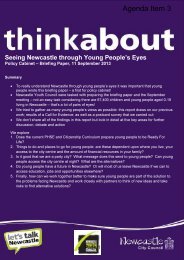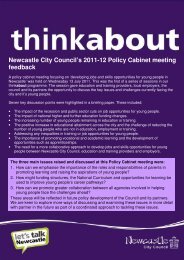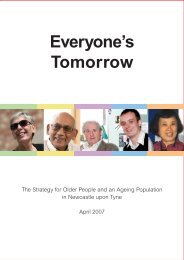NEWCASTLE'S MUSICAL HERITAGE AN INTRODUCTION By ...
NEWCASTLE'S MUSICAL HERITAGE AN INTRODUCTION By ...
NEWCASTLE'S MUSICAL HERITAGE AN INTRODUCTION By ...
You also want an ePaper? Increase the reach of your titles
YUMPU automatically turns print PDFs into web optimized ePapers that Google loves.
CHAPTER SIX<br />
THE HARMONIC SOCIETY<br />
In the second half of the 18 th Century there was a shift in cultural authority<br />
away from the church and monarchy to the state and private associations. The<br />
reasons for this sea change lay partly in the fact that the funds for church music<br />
schools fell into decline and the growth of cities and the rise of Parliamentary<br />
Government brought about new kinds of leadership that reshaped musical life in<br />
general. There were also changes in the way music was being perceived, less as<br />
an accompaniment to more pleasurable activities and more as a science in its<br />
own right. The rapid growth of industrial towns such Newcastle in the 19 th<br />
Century led to their attempts at emulating London’s amenities in the arts and not<br />
least in music. Initially town halls, especially those with an organ began serving<br />
as concert halls. This period also saw the rise of all manner of amateur musical<br />
establishments, often led by local professionals, ranging from Harmonic and<br />
Choral societies to dance schools, musical academies and schools of music.<br />
This belated recognition of the importance of music within society could not be<br />
ignored by those outside musical circles and as early as June 1798 permission<br />
was given to the Music Society in Newcastle to use the rooms of the Literary and<br />
Philosophical Society of Newcastle, once a fortnight, for private concerts. The Lit<br />
and Phil, as it is affectionately known, was founded in 1793 as a forum for the<br />
exercise of intellectual thought aimed primarily at improving society as a whole,<br />
with only Religion, the practical branch of Law, Physics and Politics, being<br />
deemed prohibited subjects of conversation within its rooms. In the following<br />
century it hosted lectures on the Science of Music as well as allowing piano<br />
recitals and talks on all manner of musical subjects from the Northumbrian pipes<br />
to Wagner’s operas. The subsequent flowering of musical life in Newcastle<br />
during the 19 th Century is fascinating and revealing and justifies a book in itself<br />
but we shall have to content ourselves with only the briefest summary of this<br />
period.<br />
Charles Avison is credited with introducing the first public concerts given in<br />
the town, and these coincided with the setting-up of the Newcastle Music Society<br />
around 1737. Regardless of which came first Avison’s public concerts were<br />
among the first of their kind in any provincial town and the Newcastle Music<br />
Society was one of the first of its kind in the country. It was well ahead of its time<br />
and put Newcastle on a par with London. The idea of the subscription concert,<br />
enabling the organisers to assess the size of the audiences for accommodation<br />
purposes, and settle matters of finance before the concerts took place, proved<br />
very popular with promoters in those early days. From 1800 onwards there<br />
seems to have been a proliferation of self sponsored concerts bearing the name<br />
of the promoter/performer in the title; the Volunteer Band Concerts, Cliffords’<br />
33

















